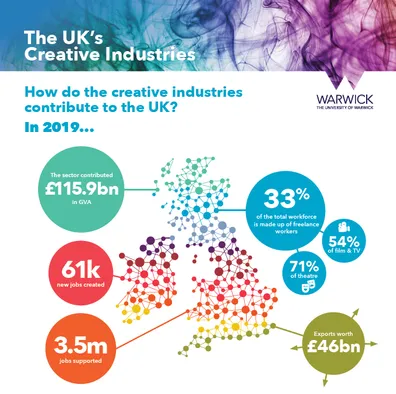Creative Industries Post Covid Workshop: 28th of March at Birmingham Rep
Hosted jointly by The University of Warwick and TUC Midlands.

Make a change to the Creative Industries Sector:

On the 28th of March in Birmingham we were joined by regional policymakers, academics, and representatives of the Arts Sector to identify interventions in the West Midlands region that will support precarious work and workers in the creative industries.
The aim of the workshop was to propose actions which could be implemented at local/ regional level - we will be joined by local freelance artists, as well as representatives from Unions to debate which actions can be taken.
Ultimately, we would like to see this sector thrive again and ensure that the Arts Sector, and its workers, are a part of more resilient and sustainable future.
The full agenda, and workshop details, can be found here.
A live recording of a workshop at Birmingham Rep hosted by University of Warwick 'Productivity and the Futures of Work' - exploring what steps we can take to build back a fairer more sustainable work environment for creative freelancers can be found here.
Why has this workshop come about?

The results of multiple lockdowns and restrictions over the past two years has highlighted the precariousness of many employees within the arts sector as their work abruptly ended with little or no national government support. The precarity alone created by freelance work led to 38,000 freelancers leaving the creative industries in 2020 as they struggled to find work in other sectors. This is a stark contrast to the 2019 figures outlined in the image to the right.
As well as the financial losses to creative arts workers themselves, there were also the bigger implications connected to unemployment and the economy. The Creative Industries Federation projected financial losses of 32% in the Midlands, equivalent to £2.2 billion GVA, with predicted job losses of 43% (51,000 jobs) in the West Midlands alone - a stark contrast to pre-pandemic times when the sector contributed £115.9 billion to the UK economy in 2019 and created 61,000 new jobs.
We, alongside the TUC, are keen to see this sector thrive once again, but recent research shows us that employees within this sector need support and better financial and work security. This could be official employment status on projects, access to worker or employment rights, longer-term contracts and some form of financial security between contracts. If such issues can be addressed and resolved, then we can all reap the benefits of this unique sector.
The aim of the workshop is therefore twofold: first, to help the creative industries in the West Midlands region to recover and, second, to help the creative industries be more resilient and sustainable in the future. How can this be done?
Previously, National level debate about post-Covid recovery for the creative industries and its workers has centred mainly on the use of the Cultural Recovery Fund and a possible Universal Basic Income. This workshop however, will explore the scope for other supplementary regional actions to improve the quality of working life in the creative industries. Other possible initiatives include local fair pay agreements, good work charters and the use of local authority procurement arrangements – all of which, alongside a host of other items, are to be discussed on the 28th.
Further Reading:
To learn more about how the pandemic has affected the Creative Industries Sector, please see below a list of further resources that help to provide further context around the pre and post-pandemic experiences associated with the sector.
The Centre of Cultural Value Report - find here
Heidi Ashton's Piece around Freelance Workers - read the blog here.
Chris Bilton's Creativity at Work Blog
Chris Bilton - Productivity in a Time of CoronaVirus
Chris Bilton - Artists with Benefits
West Midlands Culture Response Report: Collective Learning and Collective Futures
